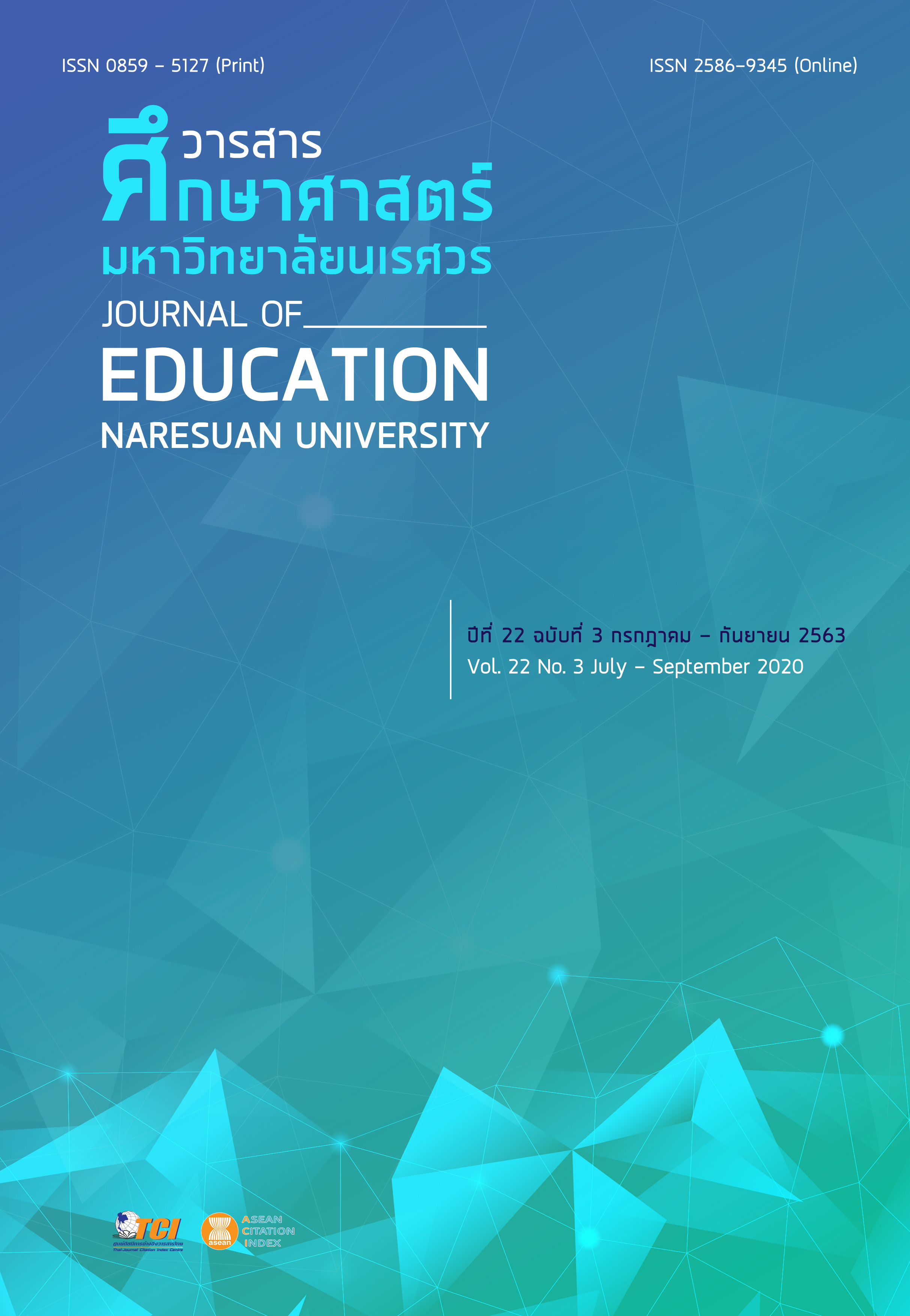DEVELOPMENT OF COLLABORATIVE PROBLEM SOLVING COMPETENCY ON 11TH GRADE STUDENTS BY USING PROBLEM BASED STEM LEARNING MANAGEMENT IN THE TOPIC OF ELECTROCHEMISTRY การพัฒนาสมรรถนะการแก้ปัญหาแบบร่วมมือของนักเรียนชั้นมัธยมศึกษาปีที่ 5 โดยการจัดการเรียนรู้ตามแนวสะเต็มศึกษาที่เน้นการใช้ปัญหาเป็นฐาน เรื่อง ไฟฟ้าเคมี
Main Article Content
Abstract
The purpose of this quality research was to develop 11th grade students’ collaborative problem solving competency by using problem based STEM learning management in the topic of electrochemistry. The participants were 29eleventh grade students. The methodology of this research was a classroom action research, through 3 continuous cycle. There were 6 steps in learning approach: 1) problem confirmation, 2) problem clarification, 3) planning, 4) contingency planning, 5) plan reorganization, and 6) assessment. The data were collected from the collaborative problem solving student’s behavior observation forms student’s activity sheet and students’ artifact. In data analysis, the content analysis approach was employed and the credibility was verified by method triangulation. The result indicated that students’ collaborative problem solving competency increased from first to third cycle of the classroom action. The best developed competency of students was establishing and maintaining group organization, followed by selecting an appropriate action to solve the problem and establishing and maintaining shared understanding, respectively. Research finding suggest that teaching needs using a real life problem such as choosing a battery car type, increasing value by electroplating, connecting the lamp when the power goes out and the activity should provide student to practically solve the problem.
Article Details
The owner of the article does not copy or violate any of its copyright. If any copyright infringement occurs or prosecution, in any case, the Editorial Board is not involved in all the rights to the owner of the article to be performed.
References
Cukurova, M., Avramides, K., Spikol, D., Luckin, R. and Mavrikis, M. (2016). An analysis framework for collaborative problem solving in practice-based learning activities: A mixed-method approach. Retrieved November 20, 2017, from http://discovery.ucl.ac.uk/1476723/1/LAK16%2Short_paper_Reviewed.pdf
Care, E., & Griffin, P. (n.d.). Assessing collaborative problem solving. Retrieved November 17, 2017, from https://sodas.ugdome.It/viesieji-puslapiai/3201
Hesse, K., Kriston, L., Mehl, S., Wittorf, A., Wiedemann, W., Wolwer, W., et al. (2015). The vicious cycle of family atmosphere, interpersonal self-concepts, and paranoia in schizophrenia-a longitudinal study. Schizophr. Bull. doi: 10.1093/schbul/sbv055
Householder, D.L. and Hailey, C.E. (2012). Incorporating engineering design challenges Into STEM courses. Retrieved November 23, 2017, from http://digitalcommons.usu.edu/ncete_publication/166
Institute for the Promotion of Teaching Science and Technology. (2017). PISA 2015 Basic summary. Bangkok: Institute for the Promotion of Teaching Science and Technology. [in Thai]
Kijkuakul, S. (2014). Learning management direction for teacher in 21st century. Phetchabun: Juladis Printing. [in Thai]
Kijkuakul, S. (2015). STEM Education. Journal of Education Neresuan University, 17(2), 201-207. [in Thai]
Lou, S., Shih, R., Diez, R. and Tseng, K. (2010). The impact of problem-based learning strategies on STEM knowledge integration and attitudes: An exploratory study among female Taiwanese senior high school student. International Journal of Technology and design Education, 21, 195-215.
OECD. (2017). PISA 2015 collaborative problem-solving framework. Paris: OECD.
O’Neil, A., Berk, M., Itsiopoulos, C., et al. (2013). A randomised, controlled trial of a dietary intervention for adults with major depression (the “SMILES” trial): study protocol. BMC Psychiatry, 13, 114. https://doi.org/10.1186/1471-244X-13-114
Partnership for 21st Century skills. (2011, January 16). Framework for 21st century learning. Retrieved April 27, 2017, from http://www.p21.org/our-worl/p21-framework
Rosen, S., & Foltz, P. W. (2014). Assessing collaborative problem solving through automated technologies. Research and Practice in Technology Enhanced Learning, 9(3), 389 – 410.
Sanger, M. J. (1996). Identifying, attributing, and dispelling student Misconceptions in electrochemistry. Retrieved April 27, 2017, from http://lib.dr.iastate.edu/cgi/viewcontent.cgi?article=12398&context=rtd
Sangkhaphan, S. (2013). Why 21st century skills. Maha Sarakham: Mahasarakham University. [in Thai]
Suwannoi, P. (2015). Problem-Based Learning (PBL). Retrieved November 21, 2017, from https://ph.kku.ac.th/thai/images/file/km/pbl-he-58-1.pdf [in Thai]


